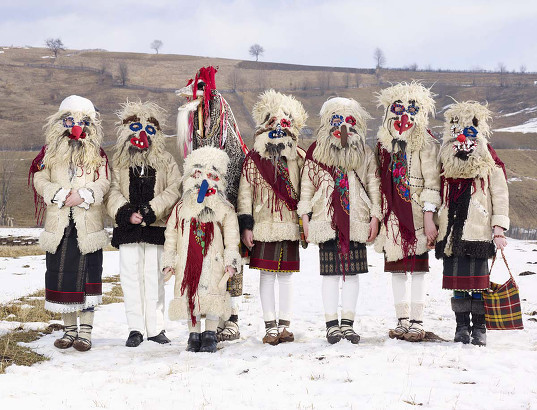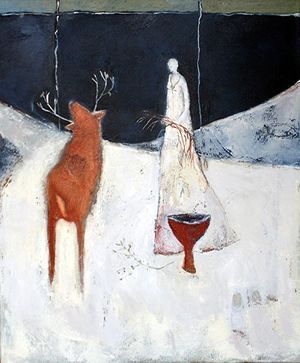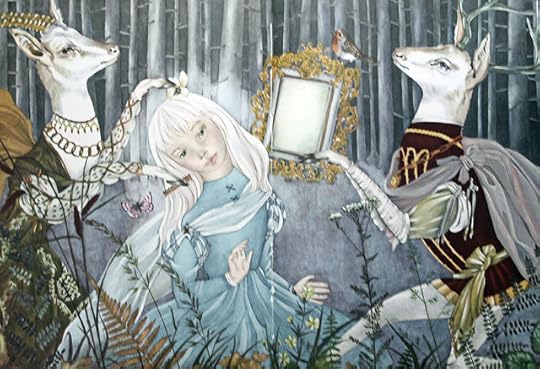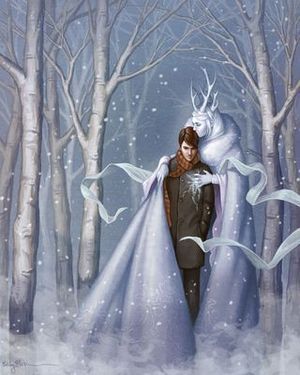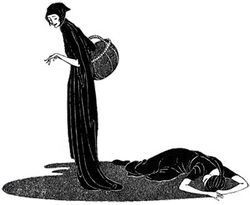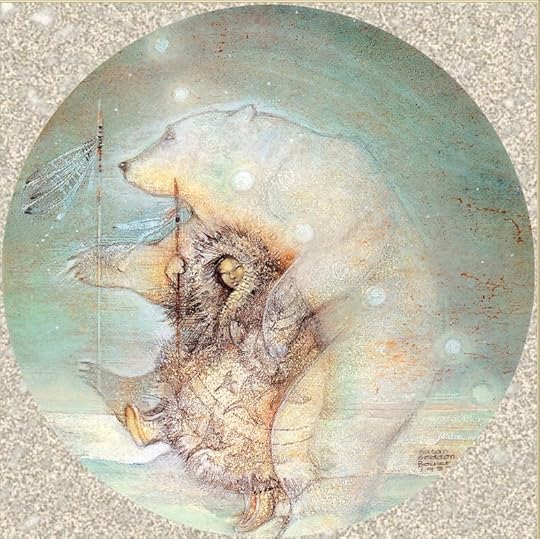Terri Windling's Blog, page 172
January 19, 2014
Tunes for a Monday Morning
I'll be off on my travels by the time you read this, so I'm setting this post up in advance for automated posting on Monday....
After a week of poetry here on Myth & Moor, I thought music by Hozier (Andrew Hozier-Byrne), from Wicklow, Ireland, would fit the bill. This young man writes lyrics with a poet's sensitivity to language, and music that blends genres (Irish folk, American blues, and more) to beautiful effect. He's released only one four-track EP so far (Take Me to Church), but I'm hoping there's much more to come.
Above: Hozier performs "Work Song" at Other Voices in Dingle, on Ireland's west coast.
Below: A lovely, simple performance of his song "Cherry Wine."
And last:
A very gorgeous song, "Take me to Church," performed for Irish radio. There's a video for it too (on Hozier's website), which is really powerful -- but also shattering and heart-breaking. If you follow the link to go and watch it, be prepared...and if you're feeling at all emotionally fragile, save it for another day.
January 18, 2014
Westward bound
Please send some soothing thoughts to our pooch today. By the time you read this, I'll be winging my way to the Arizona desert to help clear out the Endicott West Arts Retreat, which has closed its doors after many fine years. It's a bittersweet journey, sad but not tragic. All things have their seasons, after all. Endicott West was a blessing and a haven for many good folk, and now it's job is done.
I'll be returning home to Devon in only two weeks...but that's an eternity to our Tilly. Howard is with her, so she's not alone, but she finds it quite tough when either of us is away...and, I admit, I find it hard too, striding 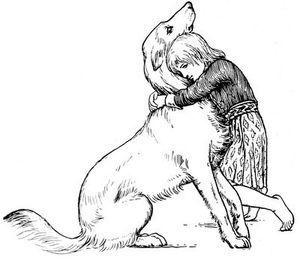 through the world without my little black shadow. I once loved to travel whole-heartedly, until Tilly came tumbling into our lives, and now....well, I still love to travel, but not with the same uncomplicated joy. Now I leave a part of myself behind, and that part is four-footed and covered in fur.
through the world without my little black shadow. I once loved to travel whole-heartedly, until Tilly came tumbling into our lives, and now....well, I still love to travel, but not with the same uncomplicated joy. Now I leave a part of myself behind, and that part is four-footed and covered in fur.
I'll miss human family members too, of course, but two weeks is a blink of an eye to us humans -- and words cross the ocean so easily these days, connecting us all in so many ways. But with animals, we speak in a language of gesture, touch, body warmth, and our calm, steady presence...all things we can't email or Skype or tweet. Yet it's a good reminder that words are not everything. Even for us writers.
Speaking of writing, I don't yet know how this blog will fare during my two weeks in Tucson. I might find it easy, perhaps even comforting, to keep up my morning blog routine, or I might find that the tasks awaiting me there will require my full concentration. I'm playing it all by ear, gentle Readers. The days ahead will unfold as they will.
The drawing above is by John D. Batten (1860-1932).
The clock strikes

The clock has gone past midnight...so here in England, at least, the Winter Poetry Challenge is now over. (If it's not yet midnight wherever you are, then you have a little more time to post.)
A huge thank you to everyone who participated this time around. It's been thrilling watching your poems appear -- works by seasoned professionals and shy newcomers sitting side by side, deep in poetic conversation. And although the Challenge closes to new poems at the stroke of twelve, please do continue to respond to the poems that are here and keep the conversation going. There are some wonderful late entries that don't yet have feedback, and shouldn't be missed.
Now I'm off to catch a pre-dawn ride to the airport, visions of bears, magic mirrors, poisoned apples, shards of ice, fleet-footed deer, wolves and wilderness travelling with me. I'm grateful to you all for a week of enchantment. The Mythic Arts community never fails to astound me.
Art above: Cinderella by Margaret Evans Price (1888-1973)
January 17, 2014
Winter Poetry Challenge: Day 5
It's the last day of the Poetry Challenge, so sharpen your pencils one last time. Our theme today is "The Wild in Myth, Folklore, and Fantasy." Interpret that as you will. Wild as in wilderness; wild as in mythic Wild Men and Wild Women; wild as in Trickster tales and characters...it's entirely up to you. If you need inspiration, have a look at this post on wild folklore from the "Into the Woods" series.
I'll post the rules of the game one more time:
I am challenging all you poets out there to share a poem (or poems) on the theme of the day. Brand new poems are encouraged, but your older poems are welcome too. You don't have to be a published poet to contribute; you don't have to be a regular reader of this blog; and you don't even have to be an adult (but if you're a child, please let us know your age). To participate, just post your poem(s) in the comments thread below. Reader response to the poems is encouraged and deeply appreciated, as our goal is feedback for every poem. It truly "take a village" to make these Challenges work, and I'm deeply grateful to you all.
Speaking of feedback, do check in on the Comment threads from earlier in the week, where lovely new poems keeping appearing, as if by magic....
As something of a departure for this last day of the Challenge, our featured poem doesn't come from the Journal of Mythic Arts, but from my friend and Chagford neighbor Tom Hirons, whose richly mythic poem "Sometimes a Wild God" is the perfect piece to kick off the day. "When the wild god arrives at the door," Tom writes,
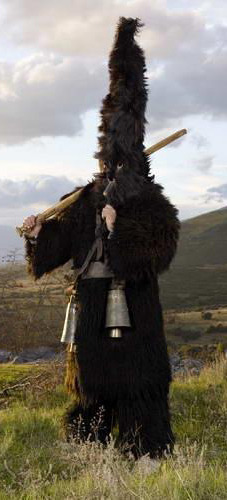 You will probably fear him.
You will probably fear him.
He reminds you of something dark
That you might have dreamt,
Or the secret you do not wish to be shared.
He will not ring the doorbell;
Instead he scrapes with his fingers
Leaving blood on the paintwork,
Though primroses grow
In circles round his feet.
You do not want to let him in.
You are very busy.
It is late, or early, and besides…
You cannot look at him straight
Because he makes you want to cry.
The dog barks.
The wild god smiles,
Holds out his hand.
The dog licks his wounds
And leads him inside...
You can read the full poem here, on Tom's Coyopa blog. Or listen to a reading of the piece by Mark Lewis below:
The photographs here come from Wilder Mann, a photography series by Charles Fréger (based in Rouen, France), who spent two years traveling through nineteen countries documenting the folk pageants and festivals of what he calls "tribal Europe." The resulting photographs have been exhibited internationally, and collected into an absolutely amazing art book. The art, in turn, inspired a CD of music by the Italian composer .and sound designer Theo Teardo, Music for Wilderness.
The Winter Poetry Challenge ends at midnight tonight, whatever your local time is. You're welcome to comment on poems after that, but no more poem entries, please, once the clock strikes midnight.
Now I'll leave you with these words by Jay Griffiths, from her fascinating and brilliant book Wild: An Elemental Journey:
“The wild. I have drunk it, deep and raw, and heard it's primal, unforgettable roar. We know it in our dreams, when our mind is off the leash, running wild. 'Outwardly, the equivalent of the unconscious is the wilderness: both of these terms meet, one step even further on, as one,' wrote Gary Snyder. 'It is in vain to dream of a wildness distinct from ourselves. There is none such,' wrote Thoreau. 'It is the bog in our brains and bowls, the primitive vigor of Nature in us, that inspires the dream.' "
Please read! If your poem doesn't appear in the Comments thread right away, don't worry, it hasn't been lost.. Typepad's spam filter sometimes shuttles comments in unfamilar formats (like poetry) into the spam folder, but I'll be checking the folder often during the Challenge, and will restore any poems I find to the Comments thread. And I have to remind folks again to PLEASE not keep trying to re-post your comment over and over, for this causes Typepad's automated spam filter to become even more hyperactive, and makes it hard for me to know which of the many duplicate comments I'm supposed to post. Just be patient. I'll check the spam box as often as I can today and make sure your comment is published.
January 16, 2014
Winter Poetry Challenge: Day 4
The theme for Day 4 of the Poetry Challenge is: Deer in Fairy Tales, Folkore, and Myth.
"As long as people have lived or hunted alongside the deer's habitats," writes Ari Berk (in Where the White Stag Runs), "there have been stories: some of kindly creatures who become the wives of mortals; or of lost children changed into deer for a time, reminding their kin to honor the relationship with the Deer People, their close neighbors. And there are darker tales, recalling strange journeys into the Otherworld, abductions, and dangerous transformations that don't end well at all. But all stories about the deer share some common ground by showing us that the line between our world and theirs is very thin indeed."
For inspiration, have a look at the week's worth of deer art, poetry, prose, and links I posted 0n Myth & Moor in July. There are so many good deer-related fairy tales and myths that the hard part will be deciding which to choose.
The rules of the Challenge are listed in Tuesday's post; if you're new to this, please read them before you join in. Everyone is welcome to participate by contributing poems, giving feedback to the poets, and joining in the conversation. Many thanks to all who have done so already...your generosity is overwhelming, everyone.
Don't forget that new poems will continue to appear under all of the posts until the Challenge closes at midnight on Saturday, so be sure to go back to the Bear, Snow White, and Snow Queen threads to read the latest offerings there too. And good luck in the woods on the trail of the deer. Enchantment abounds there. Be careful.
We start, as usual, with a poem from the Journal of Mythic Arts archives, and today it's one of mine. "Brother and Sister" is based on the Grimms' fairy tale of that name, which has haunted me ever since I was young. It's followed by a poem in response by Barth Anderson, written from the deer-brother's point of view. Barth is the author of The Patron Saint of Plagues and The Magician and the Fool, and I recommend them both with great pleasure.
Brother and Sister
by Terri Windling
do you remember, brother
those days in the wood
when you ran with the deer —
falling bloody on my doorstep at dusk
stepping from the skin
grateful to be a man?
and do you know, brother
just how I longed
to wrap myself in the golden hide
smelling of musk
blackberries and rain?
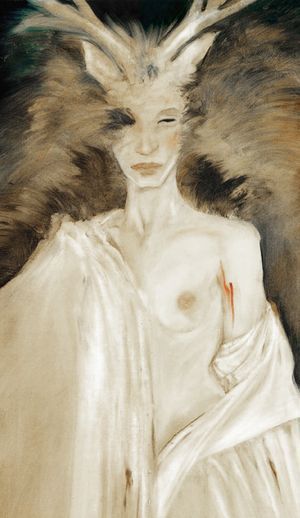 tell me that tale
tell me that tale
give me that choice
and I'll choose speed and horn and hoof —
give me that choice
all you cruel, clever fairies
and I'll choose the wood
not the prince.
Sister and Brother
by Barth Anderson
you long to run in musky rain and princely skins
but, sister, I have sped that hidebound marathon
wearing golden hides that warped my hands
to hooves
and broke my scalp with a crown of horns —
I've run through thorns and thirsty fens
through wolves that bite and cats that catch —
those blood-dried hides of hoary kings
 scoured raw my skin and
scoured raw my skin and
deadened my heart with hammering —
when I reached your hearth I shucked that hide
and faerie hands unveiled my sight:
ever beneath that scouring skin
proud, callow princes were scraped away
revealing numb and bloody men below.
but no more hides and no more hurts
run, sister, if you must but no more marathons
for me
for I choose this hearth, not the princely hide,
and I will let my skin knit smooth.
Filmmaker Lisa Stock also responded to the poem, with a beautiful short film full of deer, snow, and magic. If you ever have a chance to see it, or any of her InByTheEye productions, don't miss it.
The art above is: A medieval French "Winged Deer" tapestry design, "Out of Narnia" by papercut artist Su Blackwell, "Caretaker 2" by Jeanie Tomanek, "Deer Woman" by Susan Seddon Boulet (1941-1997), "Brother and Sister" by Carl Offterdinger (1829-1889), "Caretaker" by Jeanie Tomanek, "The Muse" by T. Windling, poster for "Brother & Ssister" - a film by Lisa Stock, "The White Deer" by Virginia Frances Sterrett (1900-1931), "Bright, Deardeer and Kit" by Adrienne Ségur, and an early 20th century photograph of a young Kenyan woman with her pet deer.
Publication information: "Brother and Sister" first appeared The Armless Maiden anthology, and was reprinted in the Journal of Mythic Arts and The Poets' Grimm. It is copyright c 1995 by T. Windling; all rights reserved by the author. "Sister and Brother" first appeared in the Journal of Mythic Arts. It is copyright c 2003 by Barth Anderson; all rights reserved by the author. All poems posted in the Comments thread are the property of their authors, who likewise reserve all rights.
Please note: If your poem doesn't appear in the Comments thread right away, don't worry, it hasn't been lost.. Typepad's spam filter sometimes shuttles comments in unfamilar formats (like poetry) into the spam folder, but I'll be checking the folder often during the Challenge, and will restore any poems I find to the Comments thread.
January 15, 2014
Winter Poetry Challenge: Day 3
Today's theme for the Poetry Challenge is The Snow Queen by Hans Christian Andersen.
Once again, if you're new to the Poetry Challenge, please read the rules (in the first post) before you join in. Deepest thanks to everyone in the Mythic Arts community who has contributed to the Challenge so far, either by bravely posting your poems, or by kindly commenting on them. (Although more commenters would be welcome. We're not yet meeting the goal of a response for each poem. Don't be shy!) And don't forget to re-visit the Bear and Snow White posts, where magical works continue to appear.
Our poem from the JoMA archives this morning is "The Snow Queen" by Jeannine Hall Gailey -- a wry, contemporary take on Kay's enthrallment to the Snow Queen from Gerda's point of view. (Sandra Gilbert also explores this idea in "The Last Poem About the Snow Queen," from her collection Blood Pressure.) Jeannine's poems have appeared widely in journals, anthologies, and on NPR's The Writer's Alamanac. She's published three poetry collections, Becoming the Villainess, She Returns to the Floating World, and Unexplained Fevers, all of which are highly recommended.
You tell yourself he only left you for her
because of the wicked shard of glass in his eye,
but the truth is, every man wants an ice princess.
The truth is, you're too easy to get used to —
your sloppy warmth, the heat from your skin
fresh from the garden — it's too much for him.
He'd rather marvel at her tedious snowflakes,
caress her frosted hair, bask in that cold gaze,
that veneer of symmetry. So you wander
around town like an idiot, forgetting
even your shoes. The boys there
are all still in awe of her. "Did you see
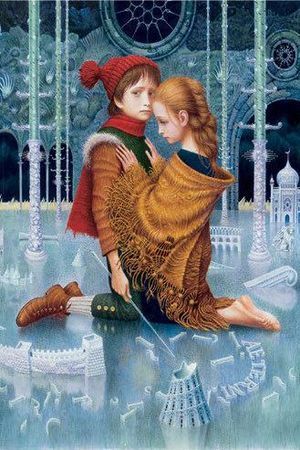 that thing she was driving?" they keep asking.
that thing she was driving?" they keep asking.
You set off to bring him back, not thinking
you are the last person he wants to see.
"He's trapped in that ice castle," you murmur,
"He needs to be rescued." Dogged, you follow
the tiny shards of glass, and their sparkle.
And when you finally find him, dark with cold
from her brutal kisses, he doesn't even
recognize you. You stop blaming the shard
in his eye; how can you rescue a man
whose heart, transfixed by skeletal crystal,
craves the bruising of frost?
Andersen's Snow Queen is a long tale, told in seven parts, and your poems can address any or all of them -- giving you many themes to explore and many characters to choose from: male and female, human and nonhuman, good-hearted and wicked (and those who are in between)...you can take your pick.
Rebecca Solnit, for example, focuses on the natural elements in Andersen's tale in this passage from The Faraway Goodbye:
"You could read The Snow Queen as a story about primordial forces versus animal empathies or even cold versus warmth. The boy with ice in his heart, Kai, disappears into the north on his sled, and his friend, Gerda, from the adjoining attic, misses him, weeps, waits for spring, kisses her grandmother goodbye, and walks to 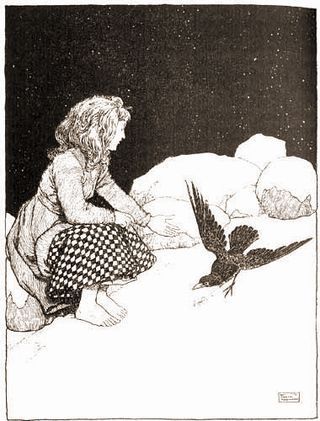 the river to begin looking for the boy." After months of delay by an old woman with a magical garden, "she escapes into a landscape where autumn is spreading, and falls in with a talking crow, and then a prince and a princess, and then a robber girl who unties a captive reindeer for Gerda to ride. The talking reindeer, who is himself a marker of how far north she is, carries her deeper into the north, into the country of winter, into her quest. On his back she reaches the home of a second old woman, a Laplander who sends her on with an introduction written on a dried cod to a third, a Finnish woman farther north. This third fate or fairy or crone lives almost naked in a saunalike house and puts ice on the reindeer's head to keep it comfortable.
the river to begin looking for the boy." After months of delay by an old woman with a magical garden, "she escapes into a landscape where autumn is spreading, and falls in with a talking crow, and then a prince and a princess, and then a robber girl who unties a captive reindeer for Gerda to ride. The talking reindeer, who is himself a marker of how far north she is, carries her deeper into the north, into the country of winter, into her quest. On his back she reaches the home of a second old woman, a Laplander who sends her on with an introduction written on a dried cod to a third, a Finnish woman farther north. This third fate or fairy or crone lives almost naked in a saunalike house and puts ice on the reindeer's head to keep it comfortable.
"Even the reindeer implores the grimy Finnish enchantress for aid for Gerda; it's a fairy tale in which everything helps the humble and openhearted, in which every creature, except the trolls and the Snow Queen, serves the principal of warmth in its own way. But the Finnish woman replies, in this story of women and animals and hardly a man, 'I can't give her any greater power than she already has. Don't you see how great it is? Don't you see how people and animals want to serve her, how she has come so far in the world in her bare feet?"
Deborah Eisenberg speaks (in Mirror, Mirror on the Wall) of how unsettling she found the fairy tale as a child:
"The febrile clarity and propulsion," she writes, "is accomplished at the expense of the reader's nerves. Especially taxing are the claims on the reader by both Kay and Gerda. Who has not, like Gerda, been exiled from the familiar comforts of one's world by the departure or defection of a beloved? And what child has not been confounded by the daily employment of impossible obstacles and challenges? Who has not been forced to accede to a longing that nothing but its object can allay? On the other hand, who has not experienced some measure or some element of Kay's despair? Who has not, at one time or another, been paralyzed and estranged as his appetite and affection for life leaches away? . . . Who has not, at least briefly, retreated into a shining hermetic fortress from which the rest of the world appears frozen and colorless? Who has not courted an annihilating involvement? Who has not mistaken intensity for significance? What devotee of art has not been denied art's blessing? And who, withholding sympathy from his unworthy self, has not been ennobled by the sympathy of a loving friend?"
Indeed.
To re-read the story, go here. To learn more about the fairy-tale-like life its author, go here.
The art above is: "The Snow Queen" by Charles Robinson (1870-1937),
"The Snow Queen" by P.J. Lynch, "The Snow Queen and Kay " by Kelley McMorris, "Kay and Gerda" and "The Snow Queen and Kay" by Vladyslav Yerko,
"Gerda and the Crow" by Charles Robinson,
"Gerda and the Reindeer" by Edmund Dulac (1882-1953),
"Gerda and Kay" by P.J. Lynch,
and "Gerda and the Reindeer" by Errol Le Cain (1941-1989).
Publication information: "The Snow Queen" first appeared in Becoming the Villainess, and was reprinted in the Journal of Mythic Arts. It is copyright c 2006 by Jeannine Hall Gailey, and all rights are reserved by the author. All poems posted in the Comments thread are the property of their authors, who likewise reserve all rights.
Please note: If your poem doesn't appear in the Comments thread right away, don't worry. Typepad's spam filter sometimes shuttles comments in unfamilar formats (like poetry) into the spam folder, but I'll be checking the folder often during the Challenge, and will restore any poems I find to the Comments thread. Please don't keep trying to repost, which can trigger Typepad to start marking everything you send as spam. Be patient and I'll make sure your comment is properly published the next time I check the spam box.
January 14, 2014
Winter Poetry Challenge: Day 2
Welcome to Day 2 of the Poetry Challenge. Our theme today is the fairy tale Snow White.
The rules of the Challenge are listed in the yesterday's post. They're simple, but if you're new to this, please read them before you join in. Many thanks to everyone who has contributed poetry so far, as well as to all you lovely readers who have been responding to the poems. The goal is to give feedback to every poem, and this wouldn't work without you. Bless you for taking the time.
Also: Please note, everyone, that there are still wonderful bear poems appearing in yesterday's Comments thread, so be sure to go back and read them too! The Challenge closes on midnight Saturday (whatever your local time is), but up until then, and you can continue to contribute poems to any of the Challenge posts.
We begin today with a heart-breaking and absolutely gorgeous Snow White poem by Delia Sherman. Delia is the author of many fine books and stories for teenagers and adults, including the fairy tale novel A Porcelain Dove, and the multi-award winning novel The Freedom Maze, which has just come out in paperback.
Snow White to the Prince
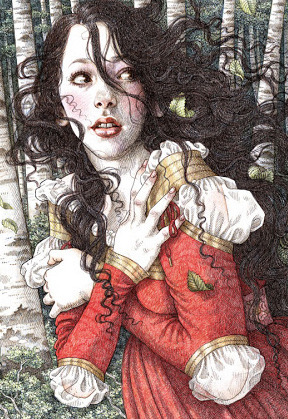 I am beautiful you say, sublime,
I am beautiful you say, sublime,
Black and crystal as a winter's night,
With lips like rubies, cabochon,
My eyes deep blue as sapphires.
I cannot blame you for your praise:
You took me for my beauty, after all;
A jewel in a casket, still as death,
A lovely effigy, a prince's prize,
The fairest in the land.
But you woke me, or your horses did,
Stumbling as they bore me down the path,
Shaking the poisoned apple from my throat.
And now you say you love me, and would wed me
For my beauty's sake. My cursed beauty.
Will you hear now why I curse it?
It should have been my mother's — it had been,
 Until I took it from her.
Until I took it from her.
I was fourteen, a flower newly blown,
My mother's faithful shadow and her joy.
I remember combing her hair one day,
Playing for love her tire-woman's part,
Folding her thick hair strand over strand
Into an ebon braid, thick as my wrist,
And pinned it round and round her head
Into a living crown.
I looked up from my handiwork and saw
Our faces, hers and mine, caught in the mirror's eye.
Twin white ovals like repeated moons
Bright amid our midnight hair. Our eyes
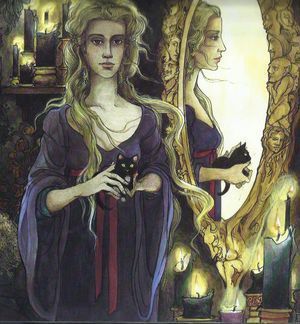 Like heaven's bowl; our lips like autumn berries.
Like heaven's bowl; our lips like autumn berries.
She frowned a little, lifted hand to throat.
Turned her head this way and then the other.
Our eyes met in the glass.
I saw what she had seen: her hair white-threaded,
Her face and throat fine-lined, her eyes softened
Like a mirror that clouds and cracks with age;
While I was newly silvered, sharp and clear.
I hid my eyes, but could not hide my knowledge.
Forty may be fair; fourteen is fairer still.
She smiled at my reflection, cold as glass,
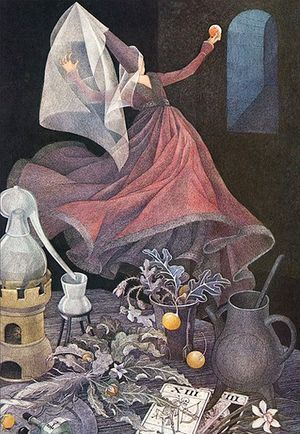 And then dismissed me thankless.
And then dismissed me thankless.
Not long after the huntsman came, bearing
A knife, a gun, a little box, to tell me
My mother no longer loved me. He spared me, though,
Unasked, because I was too beautiful to kill.
And the seven little men whose house
I kept that winter and the following year,
They loved me for my beauty's sake, my beauty
That cost me my mother's love.
Do you think I did not know her,
Ragged and gnarled and stooped like a wind-bent tree,
Her basket full of combs and pins and laces?
Of course I took her poisoned gifts. I wanted
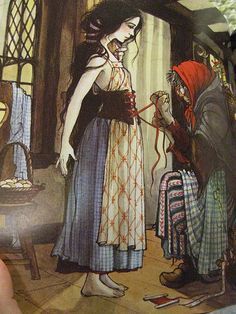 To feel her hands combing out my hair,
To feel her hands combing out my hair,
To let her lace me up, to take an apple
From her hand, a smile from her lips,
As when I was a child.
Soon after Delia published her poem, Polly Peterson wrote a poignant response:"From the Prince to Snow White." You can read it here.
To re-read the fairy tale itself, go here; and to learn about its history, go here.
The art above is: "Snow White's Mother" by Charles Santore, "Snow White's Mother" by Angela Barrett, "Snow White in the Woods" by Yvonne Gilvert, "Mirror, Mirror" by Jennie Harbour, "Mirror, Mirror" by Trina Schart Hyman (1939-2004), "The Poisoned Apple" by Nancy Ekholm Burkert, "The Poisoned Laces" by Trina Schart Hyman, "She fell down dead" (drawing) by Jennie Harbour, "Snow White's Glass Coffin" by Charles Santore, "Snow White and the Prince" by Trina Schart Hyman.
Publication information: "Snow White to the Prince" first appeared The Armless Maiden anthology, and was reprinted in the Journal of Mythic Arts. The poem is copyright c 1995 by Delia Sherman; all rights reserved by the author. All poems posted in the Comments thread are the property of their authors, who likewise reserve all rights.
Please note: If your poem doesn't appear in the Comments thread right away, don't worry. Typepad's spam filter sometimes shuttles comments in unfamilar formats (like poetry) into the spam folder, but I'll be checking the folder periodically and will restore any poems I find to the Comments thread.
January 13, 2014
Winter Poetry Challenge: Day 1
It's the Winter Poetry Challenge, which will run each day from now through Saturday. Here's how it works:
I challenge all you poets out there to share a poem (or poems) on a mythic theme posted each day. There are no rules beyond adhering to each day's theme: brand new poems are encouraged, but your older poems are welcome too. You don't have to be a published poet to contribute; you don't have to be a regular reader of this blog; and you don't even have to be an adult (but if you're a child, please let us know your age). I'll start the ball rolling each morning by posting a poem on the theme from the Journal of Mythic Arts archives, along with related imagery.
There are two ways to participate in the Poetry Challenge, both equally important: One is by posting your poem(s) in the Comments thread under each post. The other is by leaving feedback for the poets, which I highly encourage everyone to do. Please help us out by joining in the conversation.
(And if you're still not sure about how this works, have a look at the Autumn Poetry Challenge. Just follow this link and scroll down.)
Since we've been discussing bears and hibernation on this blog recently, today's theme is: Bears in Myth, Fairy Tales, and Fantasy. Some examples: the white bear in East of the Sun, West of the Moon; the bear husbands in Bearskin, Snow White and Rose Red, and various Native American tales; and the numerous bear gods, goddesses, shamans, and sacred spirits of Finland, Japan, Mongolia, Canada and other places the world over. For inspiration, have a look at the comments under last week's bear posts, full of links to bear poetry and tales.
To kick off the week, here are three bear poems from the JoMA archives, approaching the theme from three different directions. The first poem is rooted in fairy tale motifs, the second in the myths of the Arctic north, and the third in Robert Southey's classic nursery tale, Goldilocks and the Three Bears.
The Bear's Daughter
by Theodora Goss
She dreams of the south. Wandering through the silent castle,
Where snow has covered the parapets, and the windows
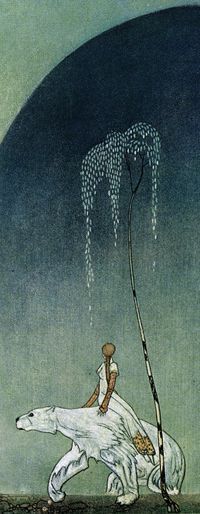 Are covered with frost, like panes of isinglass,
Are covered with frost, like panes of isinglass,
She dreams of pomegranates and olive trees.
But to be the bear's daughter is to be a daughter, as well,
Of the north. To have forgotten a time before
The tips of her fingers were blue, before her veins
Were blue like rivers flowing through fields of ice.
To have forgotten a time before her boots
Were elk-leather lined with ermine.
Somewhere in the silent castle, her mother is sleeping
In the bear's embrace, and breathing pomegranates
Into his fur. She is a daughter of the south,
With hair like honey and skin like orange-flowers.
She is a nightingale's song in the olive groves.
And her daughter, wandering through the empty garden,
Where the branches of yew trees rubbing against each other
Sound like broken violins,
Dreams of the south while a cold wind sways the privet,
Takes off her gloves, which are lined with ermine, and places
Her hands on the rim of the fountain, in which the sun
Has scattered its colors, like roses trapped in ice.
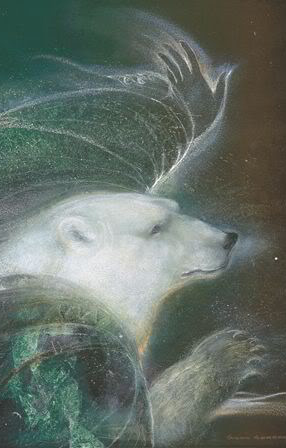 Arktos
Arktos
by Ari Berk
Rouse with hunger or indifference
to a morning darker than the night
Shake the season from your fur and rise
to stand inseperable from the snow
Below the ice swim seals thick with blood
So shaking somnolence from your brow
you crawl like a man across the drift
smelling for prey, intentions sharp as stone
Wind of knives and fury born of stars
May not deter a giant built of ice and claws
Unless the sleep of solstices be on him
He, Son of Sedna and the Northern Waste
Locks
by Neil Gaiman
We owe it to each other to tell stories,
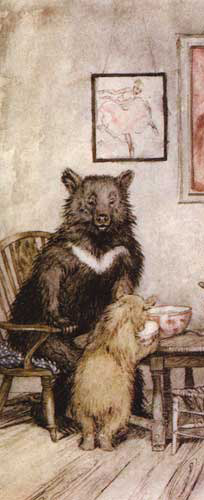 as people simply, not as father and daughter.
as people simply, not as father and daughter.
I tell it to you for the hundredth time:
"There was a little girl, called Goldilocks,
for her hair was long and golden,
and she was walking in the Wood and she saw — "
"— cows." You say it with certainty,
remembering the strayed heifers we saw in the woods
behind the house, last month.
"Well, yes, perhaps she saw cows,
but also she saw a house."
"— a great big house," you tell me.
"No, a little house, all painted, neat and tidy."
"A great big house."
You have the conviction of all two-year-olds.
I wish I had such certitude.
"Ah. Yes. A great big house.
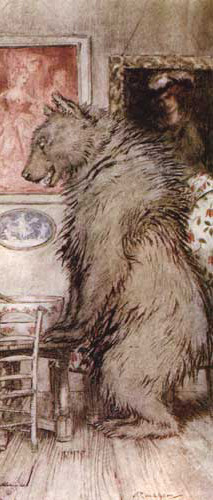 And she went in . . ."
And she went in . . ."
I remember, as I tell it, that the locks
Of Southey's heroine had silvered with age.
The Old Woman and the Three Bears . . .
Perhaps they had been golden once, when she was a child.
And now, we are already up to the porridge,
"And it was too— "
"— hot!"
"And it was too— "
— cold!"
And then it was, we chorus, "just right."
The porridge is eaten, the baby's chair is shattered,
Goldilocks goes upstairs, examines beds, and sleeps,
unwisely.
But then the bears return.
Remembering Southey still, I do the voices:
Father Bear's gruff boom scares you, and you delight in it.
When I was a small child and heard the tale,
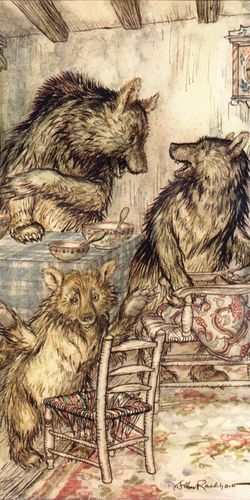 if I was anyone I was Baby Bear,
if I was anyone I was Baby Bear,
my porridge eaten, and my chair destroyed,
my bed inhabited by some strange girl.
You giggle when I do the baby's wail,
"Someone's been eating my prridge, and they've eaten it —"
"All up," you say. A response it is,
Or an amen.
The bears go upstairs hesitantly,
their house now feels desecrated. They realize
what locks are for. They reach the bedroom.
"Someone's been sleeping in my bed."
And here I hesitate, echoes of old jokes,
soft-core cartoons, crude headlines, in my head.
One day your mouth will curl at that line.
A loss of interest, later, innocence.
Innocence; as if it were a commodity.
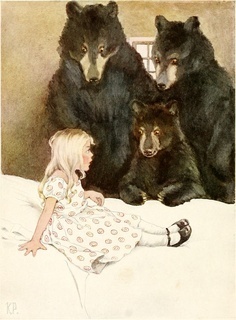 "And if I could," my father wrote to me,
"And if I could," my father wrote to me,
huge as a bear himself, when I was younger,
"I would dower you with experience, without experience."
and I, in my turn, would pass that on to you.
But we make our own mistakes. We sleep
unwisely.
It is our right. It is our madness and our glory.
The repetition echoes down the years.
When your children grow; when your dark locks begin to silver,
when you are an old woman, alone with your three bears,
what will you see? What stories will you tell?
"And then Goldilicks jumped out of the window and she ran —
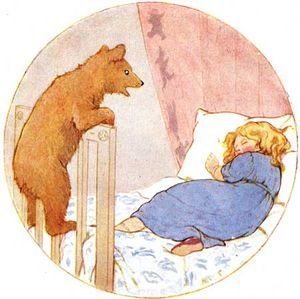 Together, now: "All the way home."
Together, now: "All the way home."
And then you say, "Again. Again. Again."
We owe it to each other to tell stories.
These days my sympathy's with Father Bear.
Before I leave my house I lock the door,
and check each bed and chair on my return.
Again.
Again.
Again.
The art above is: "Bear Dance" and "Bear Child" by Susan Seddon Boulet (1941-1997), "East of the Sun, West of the Moon" by Kay Nielsen (1886-1957), "Playing With the North Wind" by Susan Seddon Boutlet, three illustrations for Robert Southey's "Goldilock and the Three Bears" by Arthur Rackham (1867-1939), "Goldilocks" illustrations by Katherine Pyle (1863-1938) and Margaret Tarrant (1888-1958), and "The Snow Princess" by Ruth Sanderson.
Publication information: "The Bear's Daughter" first appeared in the Journal of Mythic Arts and is copyright c 2004 by Theodora Goss, who reserves all rights. "Arktos" first appeared in the Journal of Mythic Arts and is copyright c 2004 by Ari Berk, who reserves all rights. "Locks" first appeared in Silver Birch, Blood Moon (Datlow & Windling, eds.), and was reprinted in the Journal of Mythic Arts; it is copyright c 1999 by Neil Gaiman, who reserves all rights. All poems posted in the Comments thread are the property of their authors, who likewise reserve all rights to them.
Please note: If your poem doesn't appear in the Comments thread right away, don't worry. Typepad's spam filter sometimes shuttles comments in unfamilar formats (like poetry) into the spam folder, but I'll be checking the folder periodically and will restore any poems I find to the Comments thread.
January 12, 2014
Tunes for a Monday Morning
Today, three songs from the American folk singer, fiddler and banjo player Sam Amidon. He was raised in a musical clan in New England (his parents specialized in shape-note hymns), but now lives in London in old England, where he's married to the folk-fusion musician Beth Orton.
Above, Amidon takes us into the woods with a terrific version of "As I Roved Out," an Anglo-Irish song that crossed the ocean to become a staple of the American folk tradition too, albeit in a slightly different form. The song was recorded for his sixth CD, Bright Sunny South (2013), with Amidon on banjo and Chris Vatalaro on drums.
Second, a charming little video for the Appalachian folk song "Wedding Dress," made with simple puppets and stop-motion animation. The song comes from Amidon's fourth CD, All is Well (2008).
And third, "Talk to Me of Mendocino," sung by Amidon and his close friend Martha Wainwright at Le Poisson Rouge in New York City (2012).
Wainright also comes from a musical clan, being the daughter of Loudon Wainright III and the late Kate McGarrigle. (Rufus Wainwright is her brother.) This beautiful song, beautifully performed, was written by Martha Wainright's mother. Wouldn't you have loved to have been in this historic little club (it used to be The Village Gate) on this particular night?
Oh heck, here's one more:
"Magpie," a gorgeous song by Amidon's wife, Beth Orton. It's from her sixth CD, Sugaring Season (2012). This one always reminds me of Charles de Lint's tales....
And don't forget:
Myth & Moor's Winter Poetry Challenge begins tomorrow....
January 10, 2014
Calling all poets
Coming up next week, as promised: the Winter Poetry Challenge. If you missed the last one, go here to find out what it's all about. And please help spread the word to any poets (published or unpublished, young or old) who might like to participate...as well as to poetry lovers, who can contribute as well by giving the poets feedback. The Challenge will run from Tuesday, January 14 through Saturday, January 18.
The painting above is "The Snow Maiden" by Edmund Dulac (1882-1953).
Terri Windling's Blog
- Terri Windling's profile
- 708 followers











